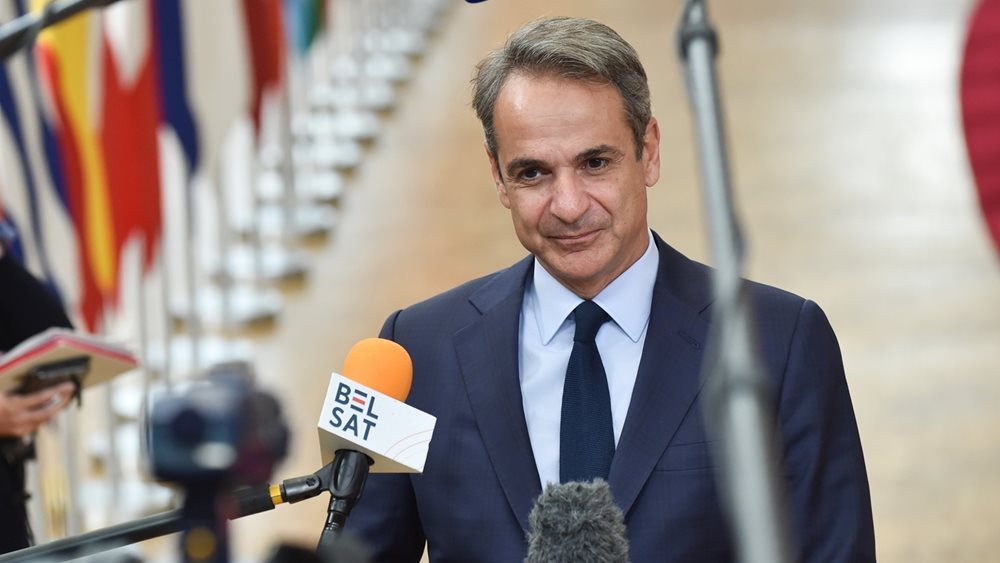Παρασκευή, 24-Οκτ-2025 13:59
PM Mitsotakis: Significant steps taken toward a common European defence policy


Prime Minister Kyriakos Mitsotakis expressed his satisfaction with the " significant steps taken toward implementing a common European defence policy” during an interview following the conclusion of the European Council meetings in Brussels on Thursday.
He specifically referred to the establishment of the escape clause and the SAFE programme, while stressing the fact that the EU Readiness Roadmap up to 2030 identifies initiatives that have always been national priorities for Greece, such as the missile defense shield, as flagship projects.
" It is also very important that there is now recognition that any defence project must take all European borders into account,” he added.
When asked about his proposal for a joint European borrowing facility, Mitsotakis noted that, at this stage, the financing tools for the aforementioned projects have not yet been specified.
" We are not yet at the point where the idea of a European Defence Fund with joint financing has matured. I will continue to present this proposal and discuss it at the European Council, and I believe the time will come when it will mature, because it responds to a genuine common European need,” he said.
Regarding the SAFE program and the discussion on the reconstruction loan for Ukraine through the use of ‘frozen’ Russian assets, the Greek Prime Minister emphasised that " Greece has made it clear that, at this time, Turkiye does not satisfy the conditions for participation in this programme, as it maintains a casus belli against Greece and continues to challenge Greek sovereignty over islands in the Aegean.”
The prime minister also confirmed that no decision was taken at Thursday's Summit regarding the reconstruction loan and noted that the European Commission is expected to soon present a legally well-founded proposal that will ensure that European partners are not exposed to unnecessary systemic risks.
When asked about the housing issue discussed at the European Council, the prime minister stated:
" The Greek government has unfolded a comprehensive plan to address the housing problem.”
He again pointed out a Greek measure to return one month’s rent to tenants at the end of November and expressed satisfaction that the issue was discussed at the European level.
" Europe has a role to play by giving us more flexibility in using European programmes - for example, for home renovations - without being strictly limited to energy upgrades. You should expect announcements from the Greek government in this direction. I believe we can be at the forefront of these initiatives. Ahead of the next budget, we must also explore European financing tools to tackle the housing problem.”
On competitiveness and the green transition, the Prime Minister insisted that, regarding energy transition, " we must be ambitious and, at the same time, realistic, so as not to undermine the competitiveness of European industry, and certainly not to cause social unrest by imposing unbearable costs on our households and businesses.”
" There is a general understanding," he added, "that we must be flexible and realistic, and that we should not prioritise the goal of climate neutrality above other objectives such as competitiveness and social cohesion, which must also be served through our policies.”
Furthermore, Mitsotakis noted that the Council conclusions clearly reflect Greek priorities, as agreed after a long discussion, and expressed satisfaction with the outcome achieved.
Finally, responding to a question about the initiative he announced a week ago concerning the 5x5 framework in the Eastern Mediterranean, the Greek prime minister stated:
" Very soon, the Ministry of Foreign Affairs will be in a position to present a clearer roadmap for this idea I have put forward. It should not surprise anyone that Greece is taking such an initiative, as our country has already participated in and launched several multilateral frameworks. We would, of course, be open to considering the participation of other Eastern Mediterranean countries, provided there is one non-negotiable condition: absolute respect for international law and the Law of the Sea. This is essential as a basic framework for discussions - both on the delimitation of maritime zones and on other issues, such as tackling the climate crisis.”

